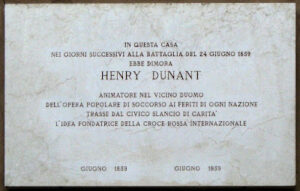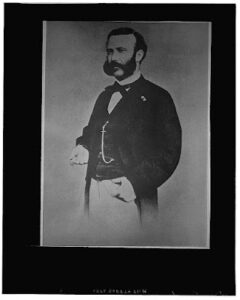
We cannot forget the earthquake that struck Gujarat on the Republic Day of India in January 2001. The All India Red Cross was the first major organization to rush to Gujarat to wipe out the grief when the state of Gujarat was ravaged by a thirty-second wrath of nature.The Red Cross is a noble organization that not only caters to the Gujarat earthquake but also to natural and man-made disasters in most parts of the world. It is a humanitarian organization that makes us realize every day that humanity is not dead in the world. Jean Henri Dunant brought that amazing system to the world.Let us learn about the history of that noble man who was born rich and spent all his property for the Red Cross and eventually died in poverty.

Dunant was born on May 8, 1828, in Switzerland, the son of a wealthy family. Naturally Dunant was more involved in religion because his parents were more religious. He left high school without completing his studies, after which he worked for a short time at the Bank of Geneva. At the age of 26 he entered the business world and then moved to Algeria to buy land in the Swiss colony of Setif.His dream is to become as rich as his father by farming and running a farm. The water needed for the farm had to be piped. The land on the side was owned by the French government, so he had to seek the permission of the French government to lay the pipe there. Meeting with French officials several times did not pay off.France was then ruled by Napoleon III. Dunant decided to meet him in person and obtain permission. It was that decision that unexpectedly diverted his life. At that time, the French army was engaged in the task of driving the Austrian forces out of Italy. Napoleon III led the army into battle. Dunant went directly to the camp of Solferino, Napoleon’s war headquarters in Italy.Dunant then carried with him a large sum of money that he would have to bribe the authorities to meet Napoleon. Roads were cut off and bridges were demolished. Somehow he reached the small town of Castiglione near Solferino with the help of a chariot.The sights he saw from the top of a hill in that small town caught his eye.

He witnessed firsthand one of the most brutal wars of the 19th century. Tens of thousands died on the battlefield and fifteen thousand wounded were fighting for their lives. Seeing those horrific tragedies, Dunant forgot his job and woke up to the humanity hidden within him.About 500 of the wounded soldiers were brought to the church where the child was. Dunant, who went there, began to administer first aid and clean wounds even though he had no medical experience. He called two doctors from that town and asked them to see a doctor. He arranged to send messages to the families, carefully writing down the details of the soldiers who were dying.He used the money he had brought to arrange food. He also called in additional doctors to treat the wounded soldiers. Dunant stayed there for a month and cared for the soldiers. However, eventually a hundred soldiers died, and four hundred soldiers recovered from his humanity and returned home.He then returned to Switzerland. For two years, his memory of his Algerian farm was completely forgotten. He saw the battle scenes he saw there day and night.He therefore thought of creating an all-world system to provide the necessary first aid to wounded soldiers in any corner of the world in the future and to save their lives. He wrote a book entitled Solferino-Memories of the horrific scenes he witnessed and experienced during the war. Medical treatment should be provided without discrimination to any soldier wounded in battle.Physicians and nurses should be allowed to treat them without hindrance. Civilians should be trained to help during the war. In the book, he called on all nations of the world to work together for such a project. The first two editions of the book, printed by Dunant, sold out quickly.So inspired was Jean-Henri Dunant that he expanded his claim a little in the next edition. Accordingly, relief work should be carried out not only during wars but also in the event of natural disasters such as floods, storms, earthquakes and fires in a country. He directly expressed his view that an all-world system should be created for it.

He then traveled across the continent of Europe, mobilizing support to create such an organization. Through his tireless hard work the All World Red Cross emerged on August 22, 1864, when the Twelve Nations met and signed with Geneva. Since the association originated in Switzerland, the colors of the flag have been reversed and adopted as the flag of the Red Cross.Dunant spent all of his property on the appearance and growth of the association and became very poor. This world totally forgot about him because he had no money even though he had created the largest organization in the world. Some historical records say that sometimes he had trouble without even food the next time.He was identified as an outstanding journalist who introduced himself to the world in 1895 after living in seclusion for over thirty years. He was later awarded the 1901 Nobel Peace Prize by the Nobel Committee. He did not use the Nobel Prize, even though he was very poor.After his death he set up a foundation to give half of that prize to the poor in Switzerland and the other half to the poor in Norway. He died on October 30, 1910, at the age of 82, of a noble man who had served the welfare of others for the rest of his life.Today the organization has expanded to the point where it can be said that there is no country without the Red Cross. The first organization that comes to mind is the Red Cross. May 8, Dunant’s birthday, is celebrated annually as Red Cross Day.The reason why Jean-Henry Dunant was able to leave such a great mark on history is because of the lofty thought of overcoming the suffering of mankind, the humanity to stretch out his arms to remove misery, and the mental courage not to be overwhelmed by obstacles. When humanity and courage combine with lofty thoughts like Dunant, we too can better achieve the goal we want.
Leave a Reply